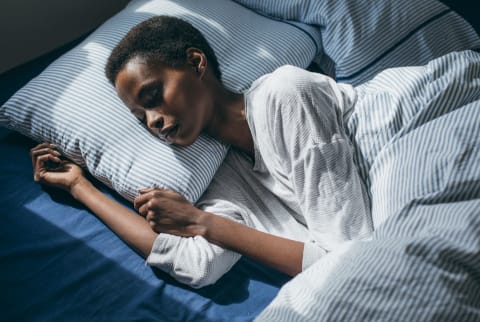
Our editors have independently chosen the products listed on this page. If you purchase something mentioned in this article, we may earn a small commission.
In case the chirping birds haven’t clued you in yet, spring has officially started in the Northern Hemisphere. While this seasonal transition always brings some levity and excitement, it can also have some not-so-sunny effects on sleep. Here are a few reasons you might be having trouble falling asleep or staying asleep at the start of spring:
1. You still haven’t quite recovered from the clock change.
If you set your clocks forward an hour on March 13, you likely felt the aftereffects the next day, and the shift might still have some impact on energy levels.
Even an hour shift in sleep patterns is enough to cause lingering grogginess and moodiness. That’s why some health care professionals have long been lobbying for us to switch over to a consistent time. (Congress finally took note this year—and you can read the reaction of sleep experts here.)
To give your body time to fully recover from DST, try to get in bed a few minutes earlier than usual for the next few weeks. Aiming to keep your home darker at night and lighter in the morning can also help you adjust to the new sunlight schedule. When possible, taking a walk first thing after waking will be especially energizing during this time of year.
“Avoid screens and TV right before bed,” adds Nicole Avena, Ph.D., an author and assistant professor of neuroscience at Mount Sinai School of Medicine, “as the lights emitted can interfere with your ability to fall asleep.”
2. Your bedroom is too hot.
You might be thrilled that the temps outside are starting to climb, but your body actually prefers winter’s cooler weather for sleep.
“In the outdoor conditions in which we evolved, the temperature drops at night. That drop is part of many contextual factors that cause us to feel sleepy,” holistic psychiatrist and sleep expert Ellen Vora, M.D., previously explained to mbg. Our body’s core temperature also tends to fall at night and increase during the day, so a lower thermostat can help promote deeper sleep.
Vora recommends keeping your bedroom at around 65 degrees Fahrenheit at night, meaning it might be time to whip out those fans and swap your flannel sheets for lighter linens.
3. You have spring fever.
Spring is most often associated with rebirth and renewal. It’s when we all start to come out of our shells after winter’s hibernation. The accompanying spring fever, while by and large a good thing, can lead to a certain degree of restlessness.
If your mind is filled to the brim with hopes and ideas for the season ahead, it can be difficult to quiet it down in time for bed.
A supplement to help: sleep support+.
sleep support+
The deep and restorative sleep you’ve always dreamt about*

While it’s gentle enough to be taken all year-round, mbg’s sleep support+ supplement is especially well suited to the spring transition. Why, you ask? Its unique blend of magnesium bisglycinate, jujube, and PharmaGABA® is formulated to not only calm the mind before bed but also get the rest of the body into relaxation mode so you can stay asleep throughout the night.* The highly absorbable bestseller also doesn’t lead to the groggy feeling of other sleep aids like melatonin.*
Dozens of five-star reviews attest to the fact that it leads to deeper sleep and more energized mornings, leaving you ready to face whatever the season throws at you.*
Every seasonal transition can take a toll on sleep, and the springtime one is no exception. The clock changes, warmer weather, and buzzy spring energy could all be keeping you up right now—but a few quick tweaks can help you rest easy.

sleep support+
The deep and restorative sleep you’ve always dreamt about*
sleep support+
The deep and restorative sleep you’ve always dreamt about*

https://www.mindbodygreen.com/articles/spring-sleep-tips








